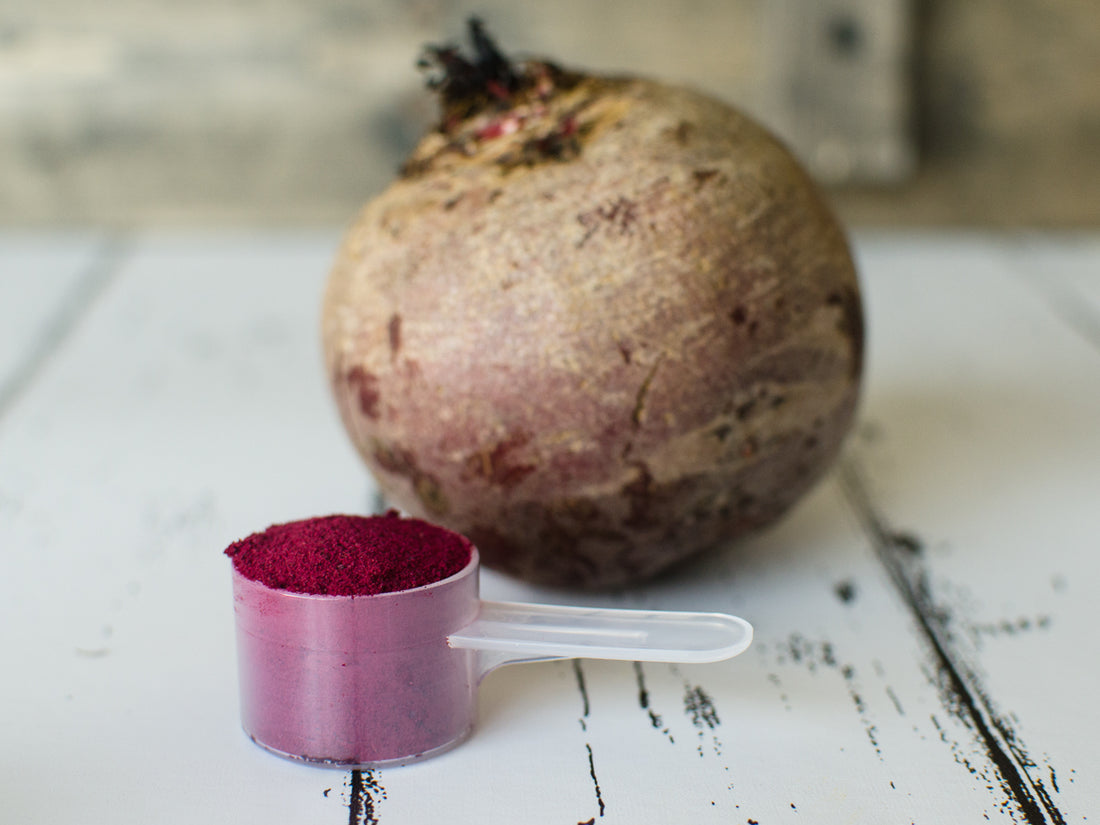
Our criteria for giving you the best quality beet powder
Share
When it comes to beet powder there are A LOT of different options to choose from. We would not have created another one to add to the 100's of beet powders already available, but when I evaluated the current powders other companies were selling, I didn't find any that lived up to the quality of powder I would want to use myself. So I decided KOYAH needed to produce a beet powder. We used 3 main criteria points when evaluating - 1. Whole Food. 2. Drying Method. 3. Where and how the beets were grown.
1. Whole-Root vs. Juice Powder - Sticking with our belief at KOYAH that fruits and vegetables work synergistically in the body when eaten in their whole form, our first criteria was it had to be a whole beet root powder and not a beet juice powder. It is important to us that our powder includes all the fiber, phytonutrients, macro-nutrients, & micro-nutrients that the beet root provides including the nitrates & betalains. A beet juice powder does not have everything a whole beet root has. We also wanted to include the skin of the beet root in our powder as most fruits and vegetables contain a lot of nutrition in their skins and beet roots are no exception. Additionally, juicing the beets before drying them concentrates the % of sugar in the powder and many of the reviews I was reading on the juice powders was that the powder was turning into a solid chunk in the container due to this concentrated sugar content.
2. Drying Method - The second criteria we used when evaluating beet powders was how they are dried. I wanted a powder that was freeze-dried at cold temperatures to preserve significantly more of the beet's nutrients than a standard air drying method which uses high heat. The very few freeze-dried powders we were able to find were freeze-dried juice powders, and like I mentioned, we wanted the whole root to be present in our powder.
3. Organically Grown in the USA - Lastly, I wanted to use organic beets that were grown in the USA. Having seen a lot of heavy metal test results for high lead levels in beet powders coming out of China and India, I wanted to make sure our powder contained very low levels of lead and other contaminants. Therefore we did not simply purchase dried beets from China or India, but instead we freeze-dry fresh organic beets that were grown right here in the USA (the same organic beets you purchase from your local grocery stores). This supports local farmers, and also cuts down on energy usage since we aren't shipping the beets half-way around the world.
The final powder is beautiful! You can see in this photo we compared it to top selling organic air dried beet powders from China and India. The deep purple color of ours is an indicator that many more of the phyto-nutrients (such has betalains) are present in our powder. We also had our finished powder tested for nitrate content and the first batch tested at 31 mg/g (or 164.3 mg per 5.3 g serving). This is more than 8 times higher than some of the organic air dried beet powders that we had tested. It also smells much fresher and tastes just like fresh beets… which we think is amazing, but maybe not so much if you don't like the taste of fresh beets.
At the end of the day, KOYAH is all about helping you eat more fruits and vegetables. If you love eating fresh beets, we are in full support of you doing so! That is the best way to get the freshest beets at the best price. On the other hand if you're looking for the convenience of a powder and quality is of importance to you, based on the criteria we mentioned above there is no better choice than our Organic Freeze-dried USA Beet Powder. If you currently use a different beet powder, we encourage you to give ours a try and compare it to the other powders you've tried. If you're new to the world of beet powders and want to start with the absolute best product, you've come to the right place!








5 comments
I agree with above comments the coa you sent us says 4820 ppm can coa please refer the nitrate count as nitrate count per mg of powder . we think that would be a huge selling point for you as no beet powders we know of test or report nitrates per mg of powder saying nitrates 4820 ppm = 4820 what mg per ppm that would = a very minute amount of nitrates clarifying testing for nitrates in your finished beet root powder to say how many nitrates per serving in mg. would go long way in boosting your sales and giving consumers information in laymans terms thanks
Would you please answer the question,, … How much lead is in the beet root powder? .. What are the actual tested results of concentrations of multiple tested batches? Like as in parts per billion.
i want to have confidence in using this product.it’s not enough to say “We have less than what would come from Asia.”, You need to say how much exactly.
What is the heavy metals content, and how much lead?
Hello, I’m very interested in your product. The only thing pausing me from becoming a lifetime buyer is not knowing the heavy metal content. Could you please send me a copy of the latest COA so that I may have assurances this it the product for me.
Thank you,
Cassandra
What is the weight of the product and how many servings per unit (container)